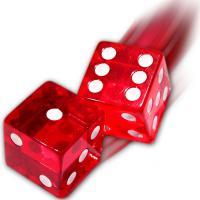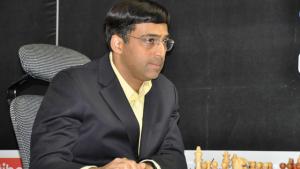
A Game of Skill
Once when I was at a tournament in Chicago, I was sitting in a restaurant in the hotel, analyzing chess with somebody. A waiter came over and said “Uh, excuse me fellas, but there is no gaming allowed in the restaurant area.” I guess he figured that since chess is a game, then it must be “gaming” (gambling). We protested that not only was chess not a game of luck, but we were not even playing. He was insistent. It was the law in Chicago, he said.
In most places, chess is legally classified as a game of skill – i.e. not gambling. Therefore tournaments can be held without any special permits and in states where gambling is not legal. If chess were classified as a game of luck, it would be devastating to the chess society. We all know that essentially there is no luck, because there is complete information – everything on the board is visible to both players. This is the tragedy of chess professionals – weak players soon discover that they have no chance. This deprives the devoted chess player of the ability to make a decent living at the thing into which he has put so much work.
Yet, at the same time, anybody playing chess in tournaments knows that your results are deeply affected by luck. There may be perfect information in the game, and if you are significantly stronger than your opposition you will win nearly 100% of the time – this is true. But at the same time, when things come down to the wire – and in individual games – fate will play a huge factor.
What is fate or luck in chess? It takes many forms. Although there is perfect information in chess about the objective state of the game (there is no probability, no hidden cards, no roll of the dice) there is one thing that you cannot control and you cannot really know – the moves and thoughts of the opponent. This is one of the ironies of chess – while it is a closed system and success entirely rests on the ability of the players, still you can only win with the help of something you cannot control, the moves of your opponent.
One of the parts of this that is clearly almost like roulette is in the opening choices. You have no control over which opening your opponent will play. He might walk into your favorite line, which you have just been studying for a week nonstop. Or, he might play something you cannot stand. If you are a significantly stronger player, you will probably win anyway; but if you are of similar strength, this is going to make all the difference.
Additionally, your opponent can make a slightly inferior move in the opening, but it can make a huge difference in the outcome of the game – sending one player to victory and another to defeat. For instance, the following was one of my better games. It was very complicated and sharp, and was a big fight to the end. Nevertheless, I honestly think the crucial moment came as early as move eight:
Here Kacheishvili chose 8.Qc2?!. It looks like much better is 8.Qa3, planning b2-b3. White has an initiative there, and I don’t like the black position so much. I did not repeat it when one of Kacheishvili’s students (also a GM) played the same line against me a couple of months later.
Would I have lost the game had he played 8.Qa3? I am not sure, but there are good chances I would. It was pure luck for me that he chose the inferior 8.Qc2 (even though both moves have been played before). By no means is the white position lost after 8.Qc2, and probably he is not even in trouble yet; but this gave me the opportunity to play actively and directly. Here is the entire game:
A year later I again played the same opponent. That time I played an inferior opening, walking into a position he had studied deeply, but with a tempo down in addition! It led to a bad loss. That time fate was not on my side – but additionally it was my own negative mindset which caused me to choose such a stubbornly fatalistic opening. This brings me to the next part of chance in chess – the energy of the players.
Chess is a certain percent technique and knowledge, but also a large part is energy. If you have no mojo, but are a much better player than your opponent, you might win anyway. But if your technical level is similar, it will come down to a battle of energy. In this area, a younger player is usually at an advantage, often enough so that it overcomes a large deficit in knowledge.
When I was playing in early 2011, for whatever reason I was at a very high energy level. Even if I didn’t get very good positions in the opening, I was still finding constant resources and winning. In some of the games I was “lucky”. But in this case, what we call “luck” is more like energy. People were unlucky to play me during that time. But in August my play crashed. Those playing me in the fall of 2011 or early 2012 were very lucky. I had a high rating in August 2011, but basically could not play chess at all.
Perhaps there is something supernatural in fate. Who knows? In the World Open in 2010 I played a game which was strongly influenced by fate. This was the second round game against Czech GM Viktor Laznicka. Laznicka had recently defeated GM Alexander Morozevich in a two game match in the World Cup, was a relatively young player and generally on the way to Super-GM-hood. I, on the other hand, growing up in a forest in Alaska where there were about three tournaments a year, simply do not have the type of background to make such a thing possible. But I was on my own sort of high, having just won clear first in the Philadelphia International.
The tension had reached a very high level in this game. Laznicka played an extremely risky opening and then thought for a huge amount of time to find a way to not lose immediately. With a very dangerous attacking position and my opponent already heading for time pressure as early as move 15, it looked like the game would easily go my way. But, tired from the preceding tournament, I could not find the best way and myself entered time pressure. With both players low on time and the position absurdly sharp, we traded blunders on almost every move. Finally, with both players having less than thirty seconds for seven moves (to reach move forty) the following position was reached:
Naturally I now played 33.Qb3+, forking the king and bishop. Since I am already up the exchange, I was then up a rook. Later, some amateur players have had the gall to say some things to me like “I heard you were up a rook, but the position wasn’t so clear”. Even just a few days ago – i.e. two years later – somebody brought up this game to me and said that. No, there is nothing unclear about it at all. Black would simply resign if there were a normal amount of time on the clock. I am sure the idea crossed his mind anyway. With me having somewhere between 10 and 30 seconds for seven moves, plus a delay of five seconds (the clock waits five seconds before it starts counting), winning should not be hard. However, nerves played a factor. Another major thing was that the organizers of the tournament had not created any kind of barrier to prevent spectators from crowding around the board and interfering with the game. At this moment there was a gigantic crowd of people literally leaning over the board, which made things more stressful.
After 33…Kf6 I played 34.Rxe3, which was fine, although 34.Qxe3 would force a queen trade which would end the game. Here is how it continued.
Neither player was keeping score, but I was fairly sure I had made the time control, since I was drawing little dashes on each move. I also knew that even before I reached move forty I could win the game by simply letting my flag fall and claiming my own time “un-forfeit”. The rule in the U.S. is that if a player does not have a full score of the game, he cannot win on time – and Laznicka most definitely did not have a full record of the game. Thus it would go to the second time control, and with me having a full hour on the clock to exploit my extra rook, he would have to resign. But I decided not to do that – it did not seem necessary, and also I anticipated that it would cause complications since the rule in the rest of the world is that you do lose on time even if your opponent does not have a full score. I also worried that maybe some mis-informed arbiter would rule against me.
But anyway, now it is move forty, and I was fairly sure of it, and also knew that even if it wasn’t, I could not lose on time. Still, nervously, I asked if it was move forty. Nobody in the gigantic crowd which was using up my oxygen said anything – and they were right not to. I decided to make one more move “just to make sure”. Ironically, I did not even make this move in time. And instead of the obvious 41.Rb7+, which would be followed by 42.Rc7 and Black’s resignation, I played 41.Nc4?? which loses for White after 41…Qg1+. Here is the entire score of this roller-coaster game, for those who like to look at car crashes. If you want to know what was going on, you could look at Loek Van Wely’s notes to the game in the New In Chess magazine.
After this game the player’s fates went in opposite directions. Two rounds later I lost a similar game to a young IM, where I was winning a rook but blundered in time pressure. I withdrew from the tournament after only five rounds. Laznicka meanwhile crushed a series of grandmasters in sharp and nice games and won clear first in the tournament, a prize of something like $15,000.
So what is chess? A game of luck, or skill? You don’t have any direct indication of the element of luck. You cannot point to a bad card or a bad roll of the dice. If you lose, it means you did something wrong. But you cannot control who your opponent is or what they do. We are humans, and your success or failure depends on things far beyond pure logic or technique. Perhaps this is one of the cruel things about chess – there is no direct element of luck, so you can only blame yourself, even if there are big parts of the game which you cannot control. Having to take personal responsibility for the winds of fate is a heavy burden.






